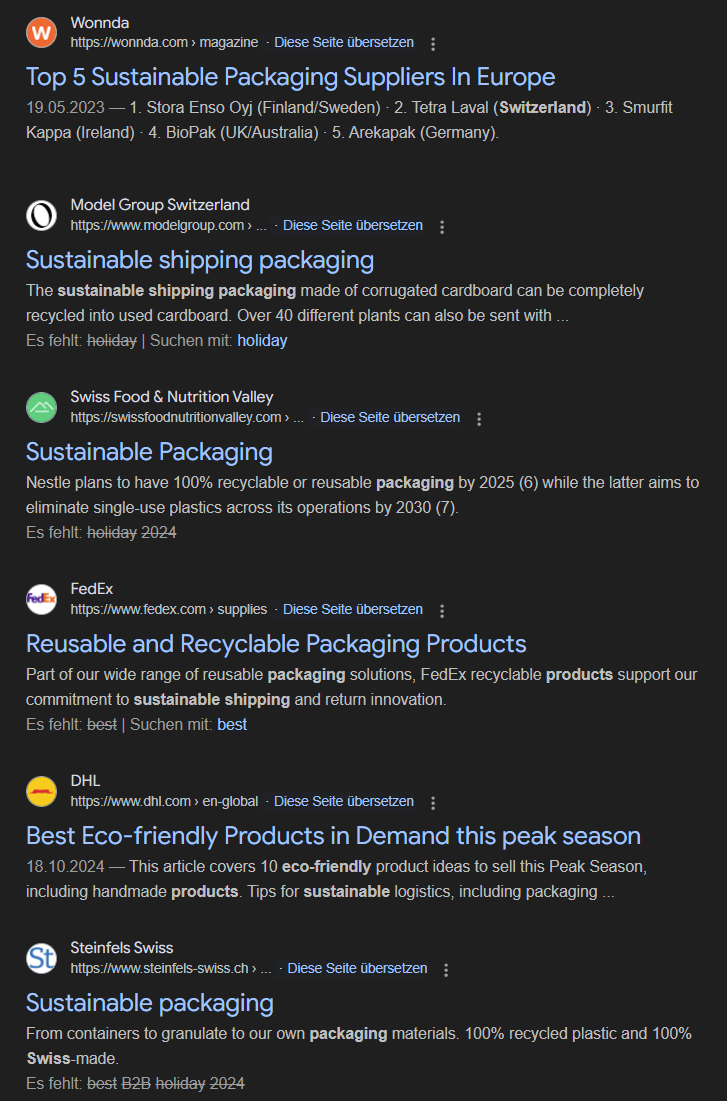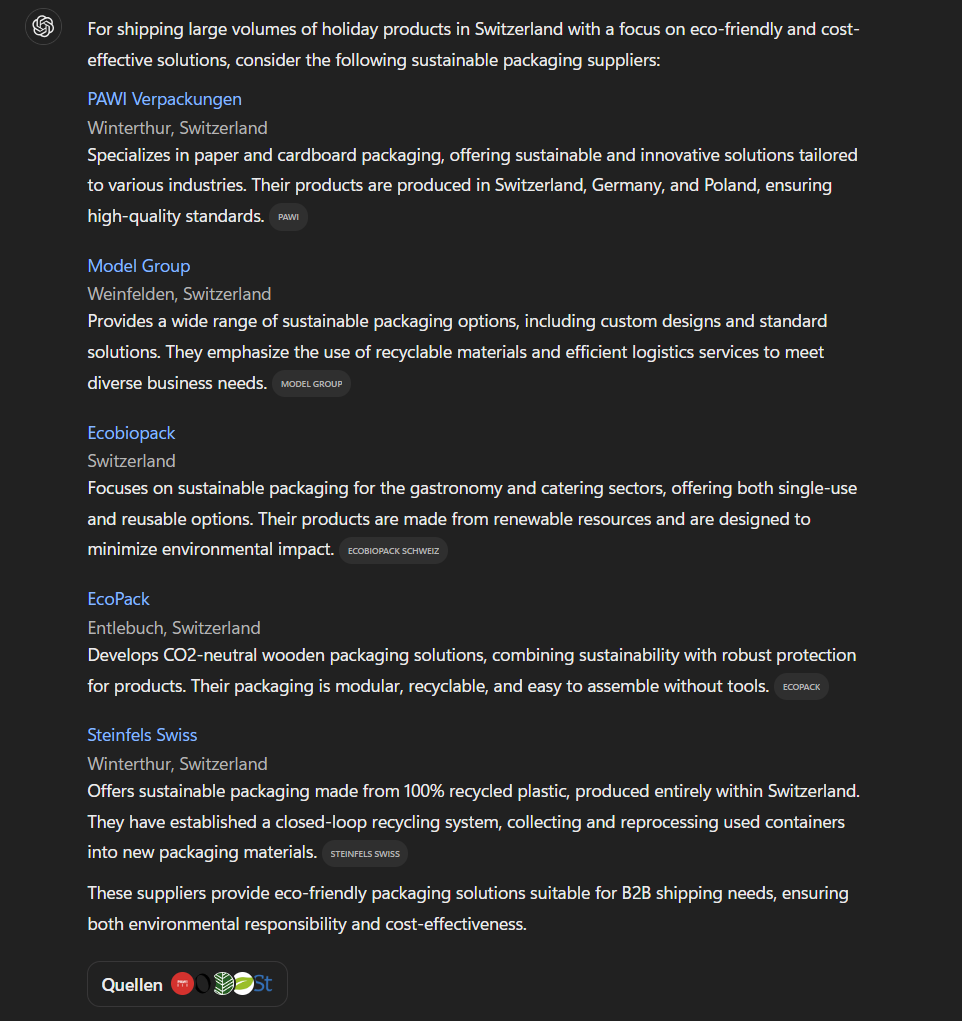Beyond traditional search engines: LLM-based decision-making in the B2B sector

Traditional search vs. LLM-based search — The key differences
According to Spatharioti et al. (2023), recent advances in large language models (LLMs) have opened up new opportunities for online search and fundamentally changed how you interact with information. Traditional search engines like Google usually provide a list of links and short summaries, so users must search multiple sources to collect and rate relevant information. While this method offers advantages — such as the variety of sources and credibility indicators (such as trustworthy domains) — it also has limitations. Users often have to enter multiple queries to refine their search, particularly if they're looking for specific or complex answers. This process can be time-consuming and often lacks the necessary contextual understanding for nuanced questions.
In contrast, LLM-based search provides a conversational user interface that combines information from various sources into a coherent answer. Users can make complex, contextual search queries and receive direct, structured answers without having to navigate through multiple links.
Research by Spatharioti et al. (2023) shows that LLM-based search tools can significantly improve user satisfaction and efficiency, particularly when it comes to decision-making tasks, as they reduce both the time required and the number of search queries.
However, the study also points to a key challenge: excessive reliance on LLM-generated answers. Because LLMs occasionally generate factually incorrect information (a phenomenon known as “hallucination”), there is a risk that users blindly trust the results without verifying them. This can lead to sub-optimal decisions, particularly when errors are not immediately apparent. To address this, researchers experimented with trust-based tags and found that color-coded uncertainty indicators helped users identify and verify potentially misleading information.
In the following sections, we show how these theoretical differences between traditional and LLM-based search affect a real business scenario and what impact generative AI can have on B2B decision making.
Practical example: The search for sustainable packaging solutions
Let's imagine the following scenario: A Swiss SME in the consumer goods sector is preparing for the Christmas shopping season — a period of sharp growth in demand. This year, however, the company is increasingly focusing on sustainability in order to meet changing customer needs and CSR goals. One of the key challenges is procuring sustainable packaging solutions for shipping large quantities of products within Switzerland.
The search should not only find any packaging supplier, but also local, environmentally friendly and cost-effective solutions that are also suitable for high shipping volumes.
The Google search

With a classic Google search for “Best sustainable packaging suppliers for B2B Christmas delivery in Switzerland,” various links and resources appear, including:
• An article about five sustainable packaging suppliers in Europe — but only one of them is in Switzerland, so further research is necessary.
• The Model Group Switzerland website with sustainable packaging solutions — but users must first navigate through the website to find relevant information.
• A Swiss Food & Nutrition Valley sustainability page that mentions Nestlé's recycling initiatives — but is not directly relevant to packaging procurement.
• FedEx and DHL information pages about environmentally friendly shipping options — but without direct connection to B2B packaging suppliers in Switzerland.
Google search provides a wide range of information but requires manual post-processing, filtering, and verification.
The ChatGPT search

With ChatGPT, the company formulates a more detailed request:
“What are the best sustainable packaging options for shipping large quantities of Christmas products for B2B in Switzerland, with a focus on environmentally friendly and cost-effective solutions? ”
ChatGPT provides a structured list of Swiss suppliers, including:
1. PAWI packaging (Winterthur, Switzerland) — specialized in sustainable paper and cardboard packaging.
2. Model Group (Weinfelden, Switzerland) — known for recyclable packaging solutions.
3. Ecobiopack (Switzerland) — sustainable packaging for the catering industry.
4. EcoPack (Entlebuch, Switzerland) — CO2-neutral wooden packaging.
5. Steinfels Swiss (Winterthur, Switzerland) — packaging made from 100% recycled plastic.
Each entry includes the company's name, location, and a brief summary of its sustainable practices. The result is a clearly organised list of options that directly addresses the specific requirements of the search query. There is no need to open multiple links or compare different websites — the information is summarized in a single answer and can be used immediately.
Key findings from the comparison
1. Efficiency and speed: ChatGPT's answer shows one of the biggest benefits of LLM-based search: It provides a comprehensive, well-structured answer in a single step. For a company with tight deadlines, this efficiency is invaluable. While informative, Google results require additional steps to achieve a comparable level of specificity and ease of use, which can be time-consuming.
2. Contextual relevance: Google results provide general information with some relevant links, but the geographical focus is wider and covers Europe rather than focusing exclusively on Switzerland. ChatGPT, on the other hand, specifically supplies Swiss suppliers who respond directly to the company's need for local and sustainable packaging solutions. This precise context adjustment highlights the strength of LLMs when it comes to handling complex, location-specific inquiries.
3. Comparability: In the ChatGPT results, each supplier is described with sufficient details so that an immediate, direct comparison is possible. The structured answer enables the company to quickly assess which providers best suit its requirements without having to visit various websites. In contrast, Google search requires users to visit each link individually, making the comparison much more difficult.
4. User experience: ChatGPT offers a curated experience in which the most important information is made available in an easy-to-understand and immediately usable way. The conversational answer is tailored exactly to the company's needs, while Google results require additional filtering and manual research. This difference shows how ChatGPT can provide a superior user experience for specific, nuanced B2B queries.
Implications and risks
The example of searching for sustainable packaging suppliers shows how LLM-based search tools such as ChatGPT can significantly improve decision-making for B2B companies. Through rapid, synthesized answers to complex inquiries, generative AI enables companies to make informed decisions faster, particularly in situations where time plays a critical role.
Risks that should be considered
Despite the clear benefits, there are also risks associated with using LLM-based search tools:
1. Potential inaccuracies: LLMs such as ChatGPT can occasionally generate “hallucinations” — i.e. factually incorrect but plausible sounding information. In a business environment, imprecisely researched data could lead to sub-optimal decisions or expensive mistakes if left unchecked. Research shows that over-reliance on LLM-generated answers without verification can be risky, particularly when making business-critical decisions.
2. Missing references: In contrast to traditional search engines, which link directly to original sources, ChatGPT summarizes information without always providing a clear reference to the source. This lack of transparency can make it difficult for users to verify information directly. B2B decision makers should therefore regard LLM-based results as a starting point and back them up with additional sources to ensure their accuracy.
3. Limited eligibility for specialized inquiries: While LLMs excel when it comes to general and moderately complex inquiries, they can reach their limits when it comes to highly specialized or technical issues. Traditional search engines can still provide more reliable insights for such niche-specific research.
Balancing AI and human judgment
In order to make optimal use of the benefits of LLM-based search, B2B companies should regard these tools as a supplement to a comprehensive decision-making strategy. ChatGPT can be used for initial research and brainstorming, but it is crucial to continue using traditional verification methods and to compare critical data sources. By combining AI-powered insights with human expertise, companies can increase productivity and improve decision quality while minimizing potential risks.
LLM-based search fundamentally changes how companies retrieve information and make decisions. Nevertheless, around 80% of searches are still carried out using classic search engines and traditional research methods. This shows that, despite progress in AI-based tools, many companies continue to rely on established search practices. The key lies in the intelligent integration of both approaches — AI to increase efficiency, traditional methods for verification. By combining the strengths of both worlds, companies can optimize their decision-making processes, minimize errors, and at the same time ensure the reliability and credibility of their data.
The future of AI search: More than just gathering information
The development of AI-powered search is progressing rapidly, and Agentic AI, like OpenAIS Operator, could accelerate this change even further. In contrast to today's search tools, Operator should not only provide information, but also act actively — whether through automatic supplier research, or even purchasing.
Imagine a future in which AI autonomously manages procurement processes and makes purchasing decisions. While this technology is still in development, it suggests that AI not only supports decisions — it could also execute them soon.



